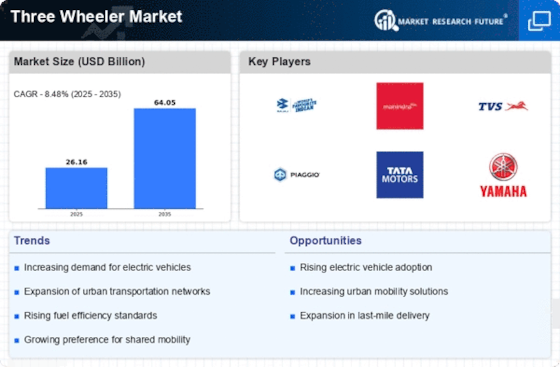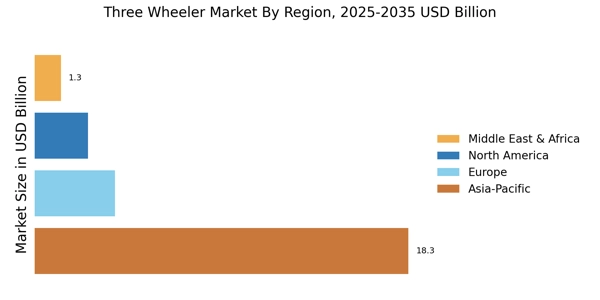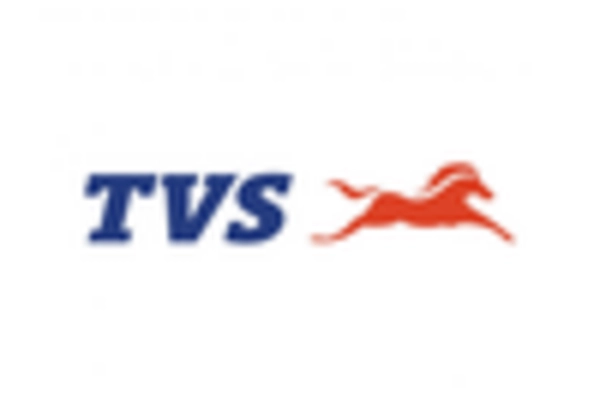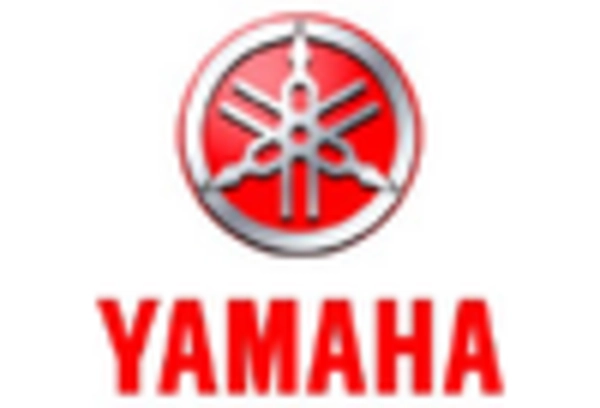Rising Urbanization
The increasing trend of urbanization appears to be a pivotal driver for the Three Wheeler Market. As more individuals migrate to urban areas, the demand for efficient and cost-effective transportation solutions intensifies. Three-wheelers, known for their maneuverability in congested city environments, are becoming a preferred choice for short-distance travel. According to recent data, urban areas are expected to house over 68% of the world's population by 2050, which could lead to a substantial rise in the demand for three-wheelers. This shift not only enhances accessibility but also supports local economies by providing employment opportunities for drivers. Consequently, the Three Wheeler Market is likely to experience significant growth as urban centers expand and the need for reliable transportation options increases.
Technological Advancements
Technological advancements are playing a crucial role in shaping the Three Wheeler Market. Innovations in vehicle design, safety features, and fuel efficiency are enhancing the appeal of three-wheelers. The integration of smart technologies, such as GPS navigation and telematics, is improving operational efficiency and safety for drivers and passengers alike. Furthermore, advancements in battery technology are making electric three-wheelers more viable, addressing range anxiety and charging infrastructure concerns. As manufacturers continue to invest in research and development, the Three Wheeler Market is likely to benefit from these technological improvements, attracting a wider customer base and fostering competitive advantages.
Evolving Consumer Preferences
Consumer preferences are evolving, with a noticeable shift towards more sustainable and economical transportation options. The Three Wheeler Market is witnessing a surge in demand as consumers increasingly prioritize affordability and efficiency. Three-wheelers offer a cost-effective alternative to traditional vehicles, making them attractive to a broad demographic, including small business owners and daily commuters. Recent surveys indicate that a significant percentage of consumers are willing to switch to three-wheelers due to their lower operational costs and environmental benefits. This shift in consumer behavior is likely to drive the growth of the Three Wheeler Market, as manufacturers adapt to meet the changing demands of the market.
Government Initiatives and Policies
Government initiatives aimed at promoting sustainable transportation solutions are likely to bolster the Three Wheeler Market. Various countries are implementing policies that encourage the adoption of three-wheelers, particularly electric variants, to reduce carbon emissions and combat air pollution. For instance, incentives such as subsidies, tax exemptions, and infrastructure development for electric vehicles are becoming commonplace. In some regions, the introduction of low-emission zones is further driving the transition towards cleaner transportation options. This regulatory support not only enhances the appeal of three-wheelers but also aligns with global sustainability goals. As a result, the Three Wheeler Market is poised for growth, driven by favorable government policies that promote eco-friendly transportation alternatives.
Growth of E-commerce and Delivery Services
The rapid growth of e-commerce and delivery services is significantly impacting the Three Wheeler Market. As online shopping becomes increasingly prevalent, the demand for efficient last-mile delivery solutions is rising. Three-wheelers, with their compact size and ability to navigate narrow streets, are well-suited for urban delivery operations. Recent statistics suggest that the e-commerce sector is projected to grow substantially, leading to an increased need for reliable delivery vehicles. This trend is likely to drive the adoption of three-wheelers in logistics and delivery services, further propelling the growth of the Three Wheeler Market as businesses seek cost-effective and efficient transportation solutions.

















